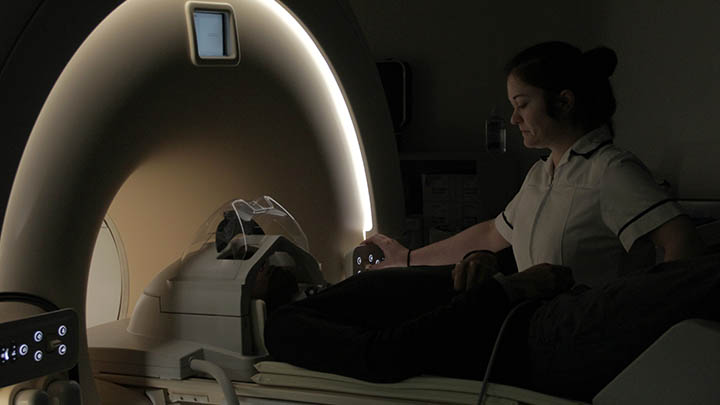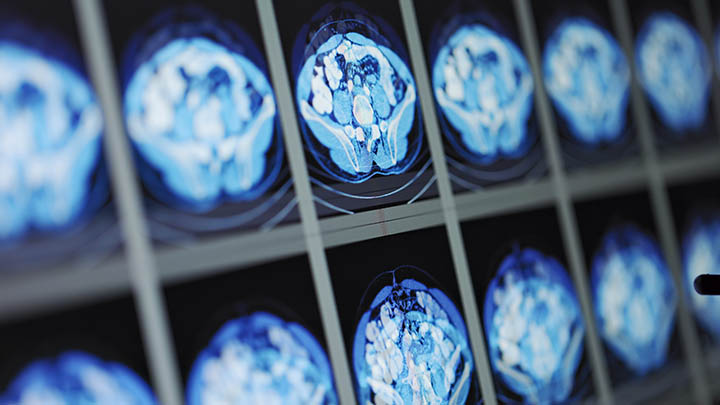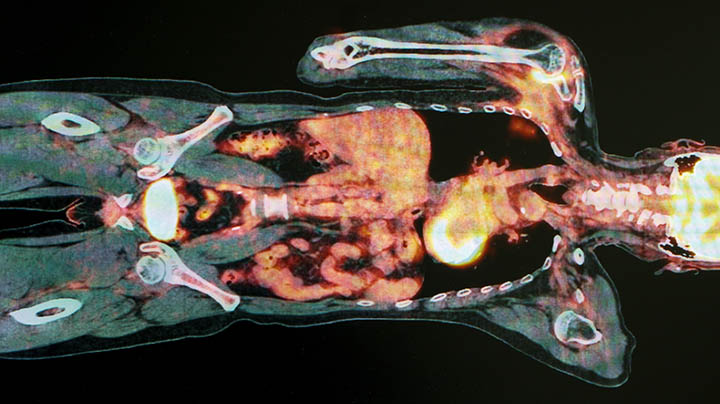Access our clinical and preclinical imaging modalities
Facilitating high-quality imaging research that helps identify effective new treatments using co-located scanners on NHS Trust premises.
The University’s Imaging Facilities, located across Greater Manchester, offer researchers access to clinical and preclinical imaging modalities, including the North-West’s only PET-MR scanner, one of just eight in the UK.
We provide high quality imaging services for a range of disease areas, from neuroscience to musculoskeletal, cardiovascular to cancer.
Through our team of expert radiographers and physicists, we can also offer support with study design, sequence development and image transfer.
We own and manage 3T MR & PET-MR clinical scanners, and PET-CT, 3T & 7T MR pre-clinical scanners.
Our services are available for internal researchers and external study teams.
How we work
High quality preclinical and clinical imaging
We offer high quality preclinical and clinical imaging for both University of Manchester and external PIs, PhD students and commercially-funded clinical trials.
Please contact Denise Ogden (denise.ogden@manchester.ac.uk) who can signpost study teams to the appropriate imaging colleague.
Research team
Our radiographers perform the scanning for study teams and transfer scan images in accordance with the study protocols. This can be to the University’s research data management system, PACS and/or an external data vendor. They are all HCPC-registered and have undertaken GCP and mandatory Trust training.
Recruitment of participants is the responsibility of the study team. Bookings are made once a study has been formally launched for imaging by the project management team.
This team acts as the hub for applications to use all of our scanners. We are happy to provide assistance with grant proposal support, including costings and imaging study design.

Our services
We provide a range of pre-award support, including costing advice, imaging study design, and data transfer and analysis.
Study teams wishing to use our facilities are invited to submit application forms that are reviewed by our in-house team of radiographers, physicists and clinicians to ensure we can deliver the scanning in question.
Our radiographers and physicists complete pre-trial questionnaires and phantom scans for clinical trials, and liaise with external data vendors to qualify our scanners.

Applications
A complete imaging package
With preclinical and clinical imaging capabilities, we offer a complete imaging package on the translational pathway.
We have experience in imaging on a range of phase I-III clinical trials across, for example, neurology, gene therapy, oncology and musculo-skeletal.
We work with clinicians and PIs to develop new clinical applications for PET-MR, where we possess the only scanner in the North-West.
We are scanning on a range of simultaneous research studies aiming to bring this novel imaging modality into the clinic, including multi-centre studies and trials with other PET-MR centres in the UK. A major part of our in-house physicists’ work is to develop novel sequences for this scanner.
As the funding for the scanner was provided by the Dementias Platform UK initiative, the focus has been on dementia research, but we also image on other disease areas such as cardiology, respiratory medicine and urology.
We have recently extended our provision at the PET-MR suite to include MR-only paediatric research scanning with participants undergoing general anaesthetic/sedation.
The Northern Care Alliance NHS Foundation Trust is home to the Manchester Centre for Clinical Neurosciences and a Philips Elition 3T MR scanner that the University has access to (installed in 2021). The scanner focuses on neuro research, with a full complement of research keys and coils.
The 3T MR scanner at the NIHR/Wellcome Trust Manchester Clinical Research Facility focuses on imaging within experimental medicine.
Researchers can apply to perform chargeable scanning on healthy volunteers via an in-house approved study to develop new methods and sequences. This enables researchers to do so without having to secure their own regulatory approvals.
This study covers the 3T MR scanner at the NIHR/Wellcome Trust Manchester Clinical Research Facility, the 3T MR scanner at Northern Care Alliance NHS Foundation Trust and the PET-MR scanner at Manchester University NHS Foundation Trust.
There is a biannual call for proposals for University staff to apply for 20 hours of free MR scanning to develop pilot data for new grant applications. This is particularly important for early career researchers in imaging.
Technologies and equipment
Supporting research projects
Based across Greater Manchester, our vast array of preclinical and clinical imaging equipment is available for use by researchers.
Clinical equipment
We own and operate a Philips 3T Achieva MR scanner, located at the NIHR/Wellcome Trust Manchester Clinical Research Facility.
We also have dedicated time on a Philips Elition 3T scanner located at the Northern Care Alliance NHS Foundation Trust (Salford). The University’s scanning sessions are operated by our radiographers.
The University’s MR scanners offer a broad range of MR techniques, including:
- Structural MRI
- Cardiac imaging
- 32 channel head coil
- [23Na] head coil
- Small joint coils and dedicated musculo-skeletal coils for knee, foot and shoulder
- Magnetic resonance angiography (MRA)
- Magnetic resonance spectroscopy (MRS)
- Functional magnetic resonance imaging (fMRI)
- Eye-tracker
- Dynamic contrast enhanced MRI (DCE-MRI)
- Oxygen-enhanced MRI (OE-MRI)
- Pharmacological MRI (pMRI)
- Diffusion and perfusion MRI
- State of the art cardiac MRI
- Arterial spin labelling (ASL)
- Carbon-13 imaging
The University was awarded £5.3 million from the Dementias Platform UK initiative via the Medical Research Council to buy and install the North-West’s first PET-MR scanner, which is primarily used for dementia-based research.
The scanner is located in a dedicated suite on the ground floor of St Mary’s Hospital in Manchester University NHS Foundation Trust, and is one of only eight in the UK.
The suite has three treatment rooms, two of which have bedhead services.
The suite also has:
- a research office;
- a consulting room;
- a fully-equipped dispensing room for drawing up radiotracers, with grade A laminar air flow cabinets.
The scanner is a fully integrated 3T PET-MR system with time of flight technology and a 60cm single bore. The system is capable of simultaneous PET-MR in the same field of view at the same time. The images are presented as co-localised datasets.
As well as simultaneous PET-MR scanning, the scanner can also be used for stand-alone MR scanning (3T).
The scanner can be used for a variety of imaging needs, including oncology, neurology, and cardiology, and supports imaging for brain/spine, musculoskeletal, breast, vascular, and whole body imaging.
We also offer fMRI and multi-nuclear imaging at this site.
Preclinical PET imaging is based at WMIC. We have a Siemens Inveon Multimodality PET-CT scanner, which uses a range of commercial radiotracers.
The 7T MRI scanner is a Bruker Avance III console interfaced to a 7T, 16cm internal bore Magnex magnet. It is equipped with:
- 740mTm-1 gradients
- a range of RF coils
- physiological monitoring
- an anaesthetic delivery system.
It is located in the Stopford Building on the University’s main Oxford Road campus.
We also have a 3T MRI scanner in WMIC. This is a benchtop system (MRS 3000 Series MRI System, MR Solutions, UK) and is equipped with:
- mouse and rat head and volume coils
- physiological monitoring
- an anaesthetic delivery system.
The animal bed (Minerve Small Animal Environment System Bioscan, France) is interchangeable between the 3T MRI scanner and the PET-CT scanner, allowing PET and MRI scans sequentially on the same animal and excellent co-registration.
Image-guided micro-irradiation for studies is provided via the SARRP research platform (Xstrahl) in WMIC, which incorporates CT imaging with precise radiation delivery to anatomical sites, mimicking facilities used in the clinic.
External access
Academic institutions and industry
Although primarily focused on supporting research at The University of Manchester, we also support work from other academic institutions and industry, including clinical trials.

Relevant experience
We have extensive experience in scanning for a range of research studies and clinical trials across multiple disease areas. All our operational staff are GCP-certified, and we have a comprehensive Quality Management System supporting all internal and external imaging work.
For more information, please contact:
Denise Ogden
Email: denise.ogden@manchester.ac.uk

Publications and outputs
An instrumental role in research leading to top-class outputs
Here is a small selection of key publications we have contributed to.
NMR in Biomedicine, 2023.
- DOI: 10.1002/nbm.5009
Fluids and Barriers of the CNS, 2023.
Parkinsonism & Related Disorders, 2023.
Journal of the American College of Cardiology: Case Reports, 2023.
Magnetic Resonance in Medicine, 2023.
- DOI: 10.1002/mrm.29840
Journal of Cerebral Blood Flow & Metabolism, 2022.
Nature Molecular Psychiatry, 2022.
Journal of Autism and Developmental Disorders, 2022.
Frontiers in Oncology, 2022.
Research study participants
Useful information
The imaging research we carry out is dependent on the participation of research study participants.
If you are taking part in one of our research studies, this section has information about the location of our scanners, information about your consent, how we use any personal data we collect and who your points of contact are.
As a participant in a research study, your first point of contact will be the referring doctor or research nurse, who will provide you with all the details of the study, and ask you to consent to being involved.
As a research study participant, you are free to withdraw your consent to being involved in a study at any time.
This section contains information on the scanner locations and how we process your data as a research study participant.
Our scanners are located at three different sites across Greater Manchester:
St Mary’s Hospital, Manchester University NHS Foundation Trust
Our PET-MR scanner is located adjacent to the Nuclear Medicine department on the ground floor of the hospital. Car parking (paid) is available in either of the two multi-storey car parks on Grafton Street and Hathersage Road.
Northern Care Alliance NHS Foundation Trust
The Philips 3T scanner is on the ground floor of the Irving Building. Car parking (paid) is available in the East Car Park across Stott Lane.
NIHR/Wellcome Trust Manchester Clinical Research Facility
Our 3T scanner is located on the ground floor of the NIHR/Wellcome Trust Manchester Clinical Research Facility building on Grafton Street in the centre of Manchester. Car parking (paid) is available in the Grafton Street multi-storey car park, which is adjacent to the CRF.
The University of Manchester processes your information in accordance to data protection laws such as the Data Protection Act 1998 (DPA) and the General Data Protection Regulation (GDPR). The Imaging Facilities, which is part of the University of Manchester, performs MR and PET-MR imaging on research study participants as part of ethically approved studies. As part of this process, the Imaging Facilities processes personal information about research study participants.
The Imaging Facilities utilises an online booking system for all imaging studies which is hosted by the University of Edinburgh. Any personal information held on the system is not shared with the University of Edinburgh; the University of Edinburgh hosts the system but only accesses the system for maintenance purposes.
The Imaging Facilities is obliged to share data on research participants with Sponsors of ethically approved studies. No personal information on research participants is shared with third parties.
Individual study teams hold personal information on participants and this, and how it is stored, will be detailed in the patient information sheets which are given to each participant by the study team when they join a study.
The Imaging Facilities holds personal information about participants, such as name, date of birth, contact number, weight, height, gender and address. We store this information in locked cabinets for a length of time as prescribed by the Sponsor of each study and access is protected and restricted to members of the Imaging Facilities’ QA team and representatives of the Sponsor.
The Imaging Facilities holds personal information about participants, such as name, date of birth, contact number, weight, height, gender and address. We store this information electronically which can only be accessed by a password. The information is retained for a length of time as prescribed by the Sponsor of each study.
Contact us
Get in touch
For further information or to inquire about using our facilities, contact:
Denise Ogden (Senior Business Operations Manager)
Email: denise.ogden@manchester.ac.uk
Tel: +44 (0)161 275 0017
Address:
The University of Manchester
Oxford Road
Manchester
M13 9PT
Technology platforms
Technology platforms
We have a pioneering environment and facilities for research, innovation and technology development.
Technology platforms main page
